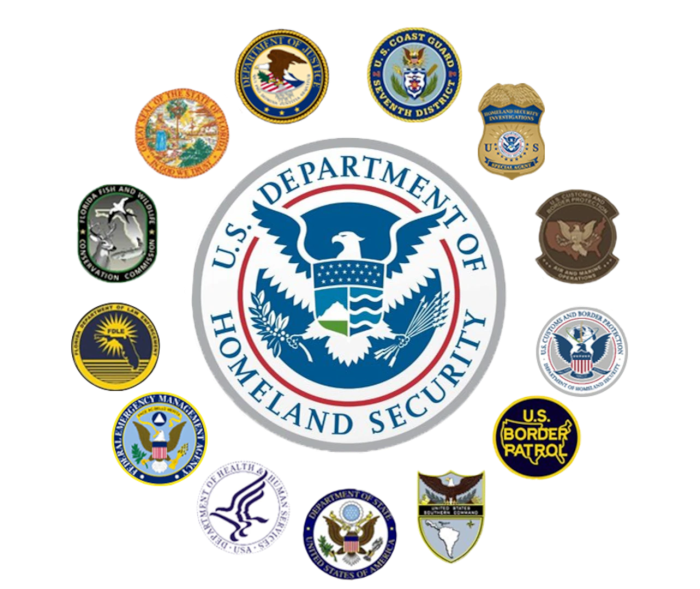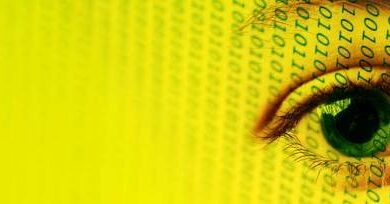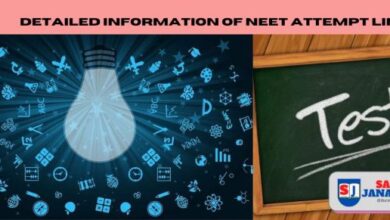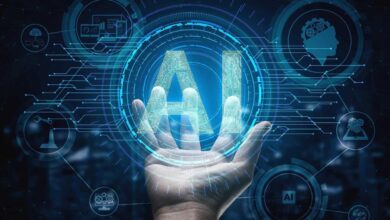
Tech Companies Chase Homeland Security: A New Frontier
Tech companies chase homeland security, a quest that intertwines the cutting edge of technology with the vital task of safeguarding our nation. As the world evolves, so too do the threats we face, and the reliance on technology to counter these threats has become increasingly paramount.
From sophisticated surveillance systems to AI-powered cybersecurity solutions, tech companies are stepping into the arena of homeland security, bringing with them a wealth of innovation and expertise.
This partnership between tech companies and government agencies is not without its complexities. The ethical implications of using advanced technologies for security purposes are hotly debated, raising concerns about privacy violations and the potential for misuse of data. The delicate balance between security and individual freedoms is at the heart of this ongoing discussion.
The Growing Role of Tech Companies in Homeland Security
The 21st century has witnessed a dramatic shift in the landscape of homeland security, with technology playing an increasingly pivotal role in safeguarding nations from threats. Government agencies, tasked with protecting citizens and critical infrastructure, are increasingly reliant on innovative solutions provided by tech companies.
This reliance stems from the complex and evolving nature of modern threats, which often exploit technological advancements for malicious purposes.
Surveillance and Monitoring
Tech companies are at the forefront of developing sophisticated surveillance technologies that aid in monitoring potential threats and preventing attacks. Advanced video analytics systems, powered by artificial intelligence (AI), can analyze vast amounts of footage in real-time, identifying suspicious activity and alerting security personnel.
For example, facial recognition technology is being deployed in airports and public spaces to identify individuals of interest and track their movements. Drones equipped with high-resolution cameras and sensors are used for aerial surveillance, providing real-time situational awareness in remote or challenging environments.
These technologies, while offering significant advantages in threat detection and prevention, raise concerns about privacy and civil liberties, requiring careful consideration of ethical implications and robust legal frameworks.
Cybersecurity
The digital age has brought about a new wave of threats, with cyberattacks posing significant risks to critical infrastructure, government systems, and financial institutions. Tech companies are actively involved in bolstering cybersecurity defenses by developing innovative solutions to protect against cyber threats.
This includes creating advanced firewalls, intrusion detection systems, and malware detection tools. Furthermore, they are developing cybersecurity training programs for government personnel, equipping them with the skills to identify and mitigate cyber threats. The increasing reliance on cloud computing and the Internet of Things (IoT) has further amplified the need for robust cybersecurity measures, and tech companies are actively working with government agencies to develop solutions that ensure the security of these interconnected systems.
It’s fascinating to see how tech companies are increasingly involved in homeland security, especially with the rise of AI and data analytics. This trend extends beyond domestic concerns, too, as global events often have a ripple effect on security measures.
For example, the recent developments in the Middle East have certainly prompted increased focus on cybersecurity and intelligence gathering, and for more information on the middle east, check out this link: more information on the middle east. This interconnectedness highlights the need for tech companies to navigate complex geopolitical landscapes while ensuring responsible use of their technology for security purposes.
Data Analytics and Intelligence
In the fight against terrorism and other threats, intelligence gathering and analysis play a crucial role. Tech companies are leveraging their expertise in data analytics to help government agencies process and analyze vast amounts of data, identifying patterns and anomalies that may indicate potential threats.
Tech companies are increasingly chasing homeland security contracts, driven by the ever-evolving landscape of threats. One of the most complex and often misunderstood challenges is the threat of Islam , which is frequently misrepresented and exploited for political gain. However, it’s crucial to remember that the vast majority of Muslims are peaceful, and the real threat comes from individuals or groups who use religion as a justification for violence.
Tech companies can play a vital role in helping to counter these threats by developing innovative security solutions and promoting understanding and dialogue.
This includes analyzing social media data, financial transactions, and communication patterns to identify potential threats and disrupt terrorist networks. The use of data analytics in homeland security is not without its challenges, however, as it raises concerns about privacy and the potential for misuse.
Striking a balance between security and privacy is essential, and ethical considerations must be carefully weighed when implementing data analytics solutions.
Partnerships and Collaborations
The increasing reliance on technology in homeland security has led to a surge in partnerships between tech companies and government agencies. These collaborations involve sharing expertise, developing joint solutions, and conducting research to address emerging threats. For instance, the Department of Homeland Security (DHS) has partnered with tech giants such as Google and Microsoft to enhance cybersecurity defenses and develop innovative solutions for border security.
These partnerships are crucial for bridging the gap between the technological capabilities of the private sector and the security needs of government agencies.
Tech Companies’ Capabilities and Expertise: Tech Companies Chase Homeland Security

The growing involvement of tech companies in homeland security is driven by their unique capabilities and expertise in developing and deploying cutting-edge technologies. These companies possess a wealth of knowledge and resources that can significantly enhance security measures, making them valuable partners for government agencies.
Technologies and Services Offered
Tech companies offer a wide range of technologies and services relevant to homeland security. These include:
- Facial Recognition:This technology uses algorithms to identify individuals from images or videos, aiding in surveillance, border control, and criminal investigations. Facial recognition systems can be deployed in various locations, including airports, public spaces, and law enforcement databases, to enhance security measures.
- Artificial Intelligence (AI):AI algorithms can analyze large datasets, identify patterns, and predict potential threats. This enables the development of intelligent systems for threat detection, risk assessment, and decision-making in homeland security applications. AI can also be used for automating tasks, such as data analysis and incident response, freeing up human resources for more strategic initiatives.
- Cloud Computing:Cloud platforms provide secure and scalable storage, processing, and data management capabilities, essential for homeland security operations. Cloud computing enables agencies to access and share critical data across different locations, enhancing collaboration and coordination. It also allows for rapid deployment and scaling of security applications, adapting to evolving threats and demands.
It’s fascinating to see how tech companies are increasingly involved in homeland security, using their expertise in data analysis and surveillance to protect us from threats. It’s almost like a mirror image of the way pharmaceutical corporations and medical research are using their knowledge to combat diseases and improve our health.
Both fields are constantly evolving, driven by innovation and the desire to keep us safe and healthy.
- Cybersecurity:Tech companies develop and deploy cybersecurity solutions to protect critical infrastructure and data from cyberattacks. These solutions include intrusion detection systems, firewalls, and data encryption tools, safeguarding against cyber threats and ensuring the resilience of homeland security systems.
- Data Analytics:Tech companies leverage advanced data analytics techniques to extract valuable insights from vast datasets, enabling agencies to identify trends, predict threats, and optimize resource allocation. Data analytics can be used for crime prediction, intelligence gathering, and risk assessment, enhancing situational awareness and proactive security measures.
Enhancement of Security Measures
The technologies offered by tech companies significantly enhance security measures in various ways:
- Improved Surveillance and Threat Detection:Facial recognition and AI algorithms can analyze real-time video feeds, identify potential threats, and alert security personnel. These technologies can be deployed in public spaces, airports, and critical infrastructure to enhance situational awareness and prevent potential attacks.
- Enhanced Border Security:Facial recognition systems are increasingly used at border crossings to verify identities and detect potential security risks. This technology helps streamline border control processes while improving security measures, preventing illegal immigration and the entry of individuals posing threats to national security.
- Effective Crime Prevention and Investigation:AI-powered systems can analyze crime data to identify patterns and predict potential criminal activity. This information can be used to allocate resources strategically, prevent crime, and solve investigations more effectively. Data analytics also plays a crucial role in identifying criminal networks and tracing financial transactions related to illegal activities.
- Cybersecurity Resilience:Tech companies offer robust cybersecurity solutions that protect critical infrastructure and data from cyberattacks. These solutions are essential for maintaining the integrity and availability of critical systems, preventing disruptions to essential services, and safeguarding national security interests.
Comparison of Capabilities
Tech companies vary in their capabilities and expertise in the homeland security sector. Some companies specialize in specific technologies, such as facial recognition or AI, while others offer a broader range of solutions.
- Palantir Technologies:Palantir is known for its advanced data analytics platform, which helps government agencies analyze vast datasets and identify patterns related to terrorism, crime, and other security threats. Their platform is used by various agencies, including the Department of Homeland Security, to improve situational awareness and enhance decision-making.
- Microsoft:Microsoft provides a comprehensive suite of cloud computing, cybersecurity, and AI solutions for homeland security. Their Azure cloud platform offers secure and scalable infrastructure for data storage, processing, and analytics, while their AI tools can be used for threat detection, risk assessment, and decision support.
- Google:Google is a leader in AI and data analytics, with its advanced algorithms and cloud computing capabilities. Their technology can be used for image recognition, natural language processing, and machine learning applications in homeland security, enabling agencies to analyze large datasets, identify trends, and make more informed decisions.
Ethical Considerations and Privacy Concerns
The increasing reliance on technology in homeland security raises crucial ethical considerations and privacy concerns. While technological advancements offer valuable tools for preventing and responding to threats, they also pose significant risks to individual freedoms and civil liberties. This section delves into the ethical implications of tech companies’ involvement in homeland security, exploring the potential for privacy violations and misuse of data, and examining the challenges of balancing security with individual freedoms.
Privacy Violations and Data Misuse
The use of technology in homeland security can lead to privacy violations and misuse of data. Surveillance technologies, such as facial recognition systems and data mining tools, can collect and analyze vast amounts of personal information, potentially exposing individuals to unauthorized access and manipulation.
The potential for data breaches and leaks raises concerns about the security and confidentiality of sensitive personal information. Moreover, the use of data for profiling and predictive policing can lead to discrimination and biased outcomes, particularly against marginalized communities.
- Facial Recognition Systems:These systems can identify individuals in real-time, raising concerns about the potential for mass surveillance and the tracking of individuals without their consent. Examples include the use of facial recognition by law enforcement agencies for crowd control and suspect identification, which has raised concerns about the potential for misidentification and wrongful arrests.
- Data Mining Tools:These tools can analyze large datasets to identify patterns and anomalies, but they can also be used to collect and analyze personal information without individuals’ knowledge or consent. This raises concerns about the potential for misuse of data for profiling and targeting individuals based on their personal characteristics.
- Predictive Policing:This approach uses data analysis to predict crime hotspots and allocate resources accordingly. However, it can also lead to biased outcomes if the data used is not representative or if it reflects existing biases in law enforcement practices. For instance, predictive policing models based on historical crime data may perpetuate existing racial disparities in policing, leading to disproportionate targeting of minority communities.
Balancing Security with Individual Freedoms
Balancing security with individual freedoms is a fundamental challenge in the context of homeland security. While technology can enhance security measures, it can also infringe upon individual rights, such as the right to privacy, freedom of speech, and freedom of assembly.
This tension requires careful consideration of the potential benefits and risks of using technology in homeland security.
- Transparency and Accountability:Ensuring transparency and accountability in the use of technology is crucial to safeguard individual rights. This includes establishing clear guidelines for data collection, storage, and use, as well as mechanisms for oversight and accountability. Public access to information about the use of technology in homeland security can promote public trust and confidence in government agencies.
- Due Process and Legal Safeguards:Legal frameworks and due process protections are essential to ensure that the use of technology in homeland security does not violate individual rights. This includes establishing clear legal standards for data collection and use, as well as providing individuals with legal remedies in case of violations.
- Public Engagement and Debate:Public engagement and debate are essential to ensure that the use of technology in homeland security is consistent with democratic values and principles. This includes involving civil society organizations, experts, and the public in discussions about the ethical implications of technology and in shaping policies that balance security with individual freedoms.
Controversies Surrounding Technology in Homeland Security
The use of technology in homeland security has been the subject of numerous controversies, highlighting the ethical and legal challenges associated with its implementation.
- The NSA Surveillance Programs:The National Security Agency’s (NSA) mass surveillance programs, revealed by Edward Snowden in 2013, sparked widespread controversy over the government’s collection of vast amounts of data on individuals, including phone calls, emails, and internet browsing history. This raised concerns about the potential for abuse of power and the erosion of privacy rights.
- The Use of Drones:The use of drones for surveillance and targeted killings has been controversial, raising concerns about the potential for civilian casualties and the lack of transparency and accountability. The use of drones in counterterrorism operations has also raised ethical questions about the use of lethal force and the potential for collateral damage.
- The Use of Facial Recognition Technology:The use of facial recognition technology by law enforcement agencies has been controversial, raising concerns about the potential for misidentification, racial bias, and the erosion of privacy rights. Examples include the use of facial recognition for surveillance purposes in public spaces, such as airports and train stations, and the use of facial recognition databases by law enforcement agencies to identify suspects.
The Future of Tech Companies in Homeland Security

The role of technology in homeland security is rapidly evolving, and tech companies are increasingly at the forefront of this transformation. As technology continues to advance at an unprecedented pace, it is crucial to understand the future trends and advancements that will shape the homeland security landscape.
This section will explore the potential impact of emerging technologies, analyze the benefits and risks of increased reliance on tech companies for homeland security, and examine the ethical considerations that must be addressed.
Future Trends and Advancements in Technology, Tech companies chase homeland security
The future of homeland security will be significantly influenced by emerging technologies such as artificial intelligence (AI), big data analytics, blockchain, and the Internet of Things (IoT). These technologies will enable more sophisticated threat detection, risk assessment, and response capabilities.
- Artificial Intelligence (AI):AI-powered systems will play a critical role in automating tasks, analyzing vast amounts of data, and identifying potential threats. AI algorithms can be trained to detect anomalies, predict future events, and optimize resource allocation. For example, AI-powered facial recognition systems can be used to identify individuals of interest in crowds, while AI-driven threat intelligence platforms can analyze social media data to identify potential terrorist activities.
- Big Data Analytics:The increasing volume of data generated by various sources, such as social media, sensor networks, and government databases, presents both opportunities and challenges for homeland security. Big data analytics techniques can help identify patterns and trends in data, enabling authorities to anticipate threats and allocate resources more effectively.
For instance, analyzing social media data can help identify potential hotspots for unrest or crime.
- Blockchain:Blockchain technology offers a secure and transparent way to track and manage information, making it particularly relevant for homeland security applications. Blockchain can be used to create tamper-proof records of critical infrastructure assets, track the movement of goods and personnel, and secure sensitive data.
For example, blockchain can be used to create a secure and transparent supply chain management system for critical infrastructure materials, reducing the risk of tampering or counterfeit goods.
- Internet of Things (IoT):The proliferation of connected devices, from smart sensors to drones, is creating a vast network of data sources that can be used to enhance homeland security. IoT devices can provide real-time information on environmental conditions, infrastructure integrity, and potential threats.
For example, IoT sensors can be deployed in critical infrastructure facilities to monitor for anomalies or potential breaches.
Hypothetical Scenario: The Impact of Emerging Technologies
Imagine a future where AI-powered drones equipped with facial recognition technology patrol major cities, continuously monitoring crowds for potential threats. These drones can identify individuals of interest based on real-time data analysis and alert authorities to any suspicious behavior. Additionally, AI-driven predictive analytics systems can analyze social media data to identify potential terrorist plots before they occur, allowing authorities to intervene and prevent attacks.
While this scenario offers the potential for enhanced security, it also raises significant ethical concerns regarding privacy and civil liberties.
Benefits and Risks of Increased Reliance on Tech Companies
The increased reliance on tech companies for homeland security presents both benefits and risks.






